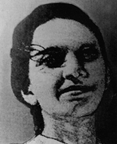Datta, Kalpana

Datta, Kalpana (1913-1995) a revolutionary, was born at Sripur of Chittagong district on 27 July 1913. Having matriculated in 1929 from Chittagong, Kalpana Datta went to Calcutta and joined the bethune college. Greatly influenced by the examples set by the revolutionaries kshudiram basu and Kanailal Datta, she soon joined the Chhatri Sanggha. purnendu dastidar drew her into the revolutionary circle of Mastarda surya sen.
The Chittagong Armoury Raid took place on 18 April 1930 and Kalpana hurried back to Chittagong and came in contact with Surya Sen in May 1931. In the meantime, many of the leaders of the Raid like Ananta Singh, Ganesh Ghosh and Loknath Bal had been arrested and were awaiting trial.
Kalpana was entrusted with the safe carrying of heavy explosive materials from Calcutta. She also secretly prepared ‘gun-cotton’ and planned to plant a dynamite fuse under the court building and inside the jail to free the revolutionary leaders, who were being tried in a special Tribunal.
The plot was uncovered and certain restrictions were imposed on Kalpana's movements. She, however, managed to visit regularly the village of Surya Sen, sometimes even at dead of night. She also used to have regular training in revolver shooting, along with her comrade pritilata waddedar.
In September 1931 Surya Sen decided to entrust Kalpana and Pritilata with a plan to attack the European Club at Chittagong. A week before the action Kalpana was arrested while moving out for a survey work in a boy's attire. While in jail, she was told about the Pahartali action and the heroic suicide of Pritilata. Being released on bail, she went underground at the bidding of Surya Sen and in the early hours of 17 February 1933 the police encircled their hideout. Surya Sen was captured while Kalpana, along with Manindra Datta, escaped.
On 19 May 1933 Kalpana, with some comrades, was arrested. In the second supplementary trial of Chittagong Armoury Raid case, Surya Sen and Tarakeswar Dastidar were sentenced to death, and Kalpana was sentenced to transportation for life. Being released in 1939 she graduated from the Calcutta University in 1940. Soon she joined the CPI and resumed her battle against the British rule. She married PC Joshi, the leader of the CPI in 1943. She went back to Chittagong and organised the Kisans' and women's fronts of the party. In 1946 she contested, though unsuccessfully, in the elections to the Bengal Legislative Assembly. After 1947 she migrated to India and resigned from active politics.
Kalpana Datta breathed her last at New Delhi on 8 February 1995. [Sailesh Kumar Bandyopadhyay]
